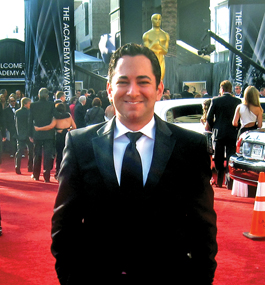The Awards Oracle

Photo Courtesy of Scott Feinberg
Scott Feinberg ’08
In hindsight, Scott Feinberg ’08 admits, it was a little risky to interview Paris Hilton in downtown Boston on the same afternoon he had a major sociology exam at Brandeis.
But his blog about the film industry, which he launched just before his freshman year, had started to gain traction. Even though its primary focus was the Oscars race, he couldn’t pass up an offer to interview the celebrity while she was in town.
Hilton, naturally, showed up quite late for the interview, and Feinberg didn’t make it back to class on time. Fortunately, his excuse for missing the exam was so original that his professor marked him down only one letter grade on the makeup test.
Four years later, Feinberg is still chasing interviews and writing about film — now as an industry expert.
A one-year stint as the Oscars blogger at the Los Angeles Times led to a dream job as the lead awards analyst at The Hollywood Reporter, the film industry’s premier trade paper. Not coincidentally, the acting chops of his interview subjects have also improved markedly. This past awards season, for instance, Feinberg conducted penetrating chats with the likes of George Clooney, Jane Fonda, Jon Hamm, Madonna, Daniel Radcliffe, Meryl Streep and Oprah Winfrey.
Cue Feinberg’s flashback reel and you’ll see a 14-year-old in leafy Woodbridge, Conn., making the fateful decision to watch the top four films on the American Film Institute’s (AFI) list of the 100 greatest movies: “Citizen Kane,” “Casablanca,” “The Godfather” and “Gone with the Wind.” At the time, Feinberg says, he assumed that watching old black-and-white movies would be “painful.”
Instead, the experience ignited a love affair with film history that ultimately inspired Feinberg to view all 100 films on the list — in the space of a year. Next came the 300 other AFI nominated films and, finally, Feinberg conquered the longest list of all: all the nominees and winners of major Oscars since the inaugural Academy Awards ceremony in 1929.
In the process, Feinberg discovered a talent for predicting Oscar winners. The Academy, he realized, has always responded similarly to certain kinds of narratives, themes and genres. For example, dramas offering social commentary generally get the nod over comedies. Some Oscar-precursor awards — especially those given by professional associations like the Directors Guild of America and the Screen Actors Guild — tend to predict Oscar success. And, crucially, it’s not always about what or who deserves to win, but what or whose time has come.
The New York Times, Associated Press and Vanity Fair have all hailed Feinberg’s powers of prediction. His strongest overall showings came in 2004 and 2006, when he correctly forecast 20 and 21, respectively, out of the 24 categories. Yet his most satisfying moments occurred when he predicted best-picture nominations few other experts saw coming: “The Reader” in 2009, “The Blind Side” in 2010 and “Extremely Loud and Incredibly Close” this year.
Some dreams do come true in Hollywood, Feinberg realized. “I remember being at Brandeis my senior year, as the global economy was beginning to collapse, and wondering what I was going to do with my life,” he says. “I asked myself: If I could do anything, what would I want to do?
“I came up with an answer, but I didn’t think there was such a job. Now I’m doing it.”
— Laura Gardner
